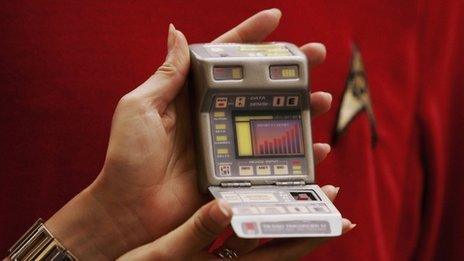Digital Medicine: Machines for living
- Published

Prevention not cure has always been good health advice but the trick has been to diagnose early enough. Now a range of medical technologies for use both inside and outside the body may give prevention the upper hand and close the gap between diagnosis and cure.
Nowadays doctors are able to monitor the health of their patients without meeting them. Sensors, such as heart monitors or other implanted devices, can send data via smart phones to hospitals and health professionals to help them spot problems before they occur.
But in the future this growing area of medicine may go from the edge to the centre of medicine and have an impact on human longevity.
The Qualcomm Tricorder X Prize, external will give $10m (£6.5m) to the developer of a wireless hand-held device that monitors and diagnoses health conditions. Its sponsors, the X-Prize Foundation, a US charity, and Qualcomm, a US telecommunications technology firm, were inspired by the tricorder, external - a hi-tech sensor used by the characters in Star Trek, the science fiction television serial.

Star Trek's tricorder: science fiction inspires modern technology
"If we look at the history of technology over the last hundred years, it has extended life in a dramatic way," says Don Jones, vice president of global strategy and market development, with Qualcomm Life, a company that makes wireless technology for use in healthcare.
"I think we're going to see new technologies we have trouble imagining today, in the same way that Star Trek imagined the tricorder in the 1960s. Today we actually believe that such things are possible," he says.
The plan is to develop a device that can scan the body and obtain measurements of different medical states or conditions.
"The data would be used to inform the consumer about their state of health and potentially make recommendations about what they might do," says Mark Winter, senior director at the X-Prize Foundation.
Winter also envisages implanted devices becoming a major facet of healthcare, though he is concerned that the public may reject them.
"People are afraid of things that are invasive in their body," he says.
Nonetheless, he believes that implanted sensors are going to be the cornerstone of healthcare in the future.
"It's up to us, as a community, to help people understand this technology and how it can improve their lives and their health," says Winter.
It is now possible to remotely monitor the ECG (electrocardiogram) of a patient over the internet. The University of Southern California (USC) carried out clinical trials of a device that delivers readings instantaneously via a smart phone.

The AliveCor Heart monitor sends health data wirelessly
"I think body monitoring and body computing will become so ubiquitous that they will be part of our cultural dialogue," says Dr Leslie Saxon, executive director and founder of USC's Center for Body Computing.
"Digital medicine will help us live easier and, hopefully, it will be harder to die," adds Saxon, who is a cardiologist.
"Every patient will have some kind of sensor that's picking up their body signals from their body computer."
Proponents of putting monitoring tools into the hands of the patient argue that it empowers them and so turns the conventional health paradigm on its head.
"My vision is, you're in charge of yourself," says Dr David Agus, a professor of both medicine and engineering at USC.
"The old days of your doctor being in charge of your health - take that and throw it out the window," says Agus.
"Most diseases are preventable or delayable. We need to be in charge of that."
Technology will play a growing role in our quest for longer, healthier lives. Digital devices will act as our guardian angels and an array of gadgets will shadow our lives.
Joe Perez, a founder of several technology companies, believes that, "mobile life coaches" will help monitor our diets and fitness regimes.
"Without having somebody push you, whether it's a gym buddy or some concept of a coach, you tend to fall off the wagon," says Perez.
He adds that the concept of a mobile life coach, cajoling and encouraging us to make certain life choices, is still in its infancy. But he believes that there will soon be a myriad of devices monitoring and analysing our state of health, food intake, exercise and social behaviour.
His hope is that the devices will prompt people to make decisions that could help them live longer.
For the moment "we don't know the interface", says Perez. He speculates that it could be an app, or application software, like Siri, which lets people talk to their mobile phone and be answered.
It would tell you, "'Hey, this is where you are,' and, 'This is what you're doing,' and, 'Did you go to this?' and, 'Did you do that?' Or it could be some robotic thing texting you," says Perez.
"Ten years from now, you're going to look back and say, 'Oh yeah, I knew about that cancer, it was on its way and we had it taken care of'."
Perez adds that the current practice of health screenings for certain diseases, starting at a specific age, will become a thing of the past.
"We'll have devices all over the place and information flowing all the time, and that will change wellness."
You can find out more about What if the BBC's special series looking at aspects of the future, throughout February and March
You can follow the Magazine on Twitter, external and on Facebook, external